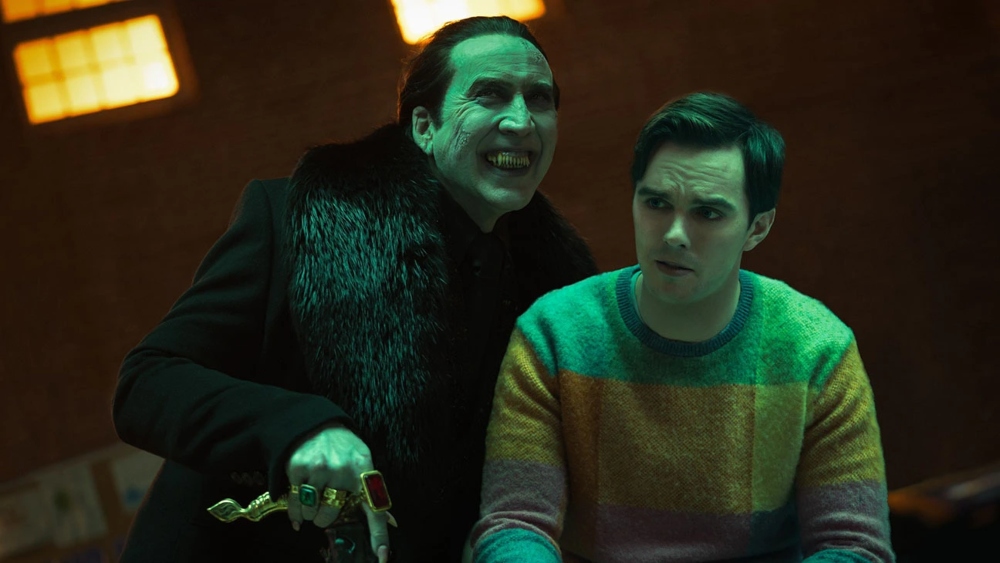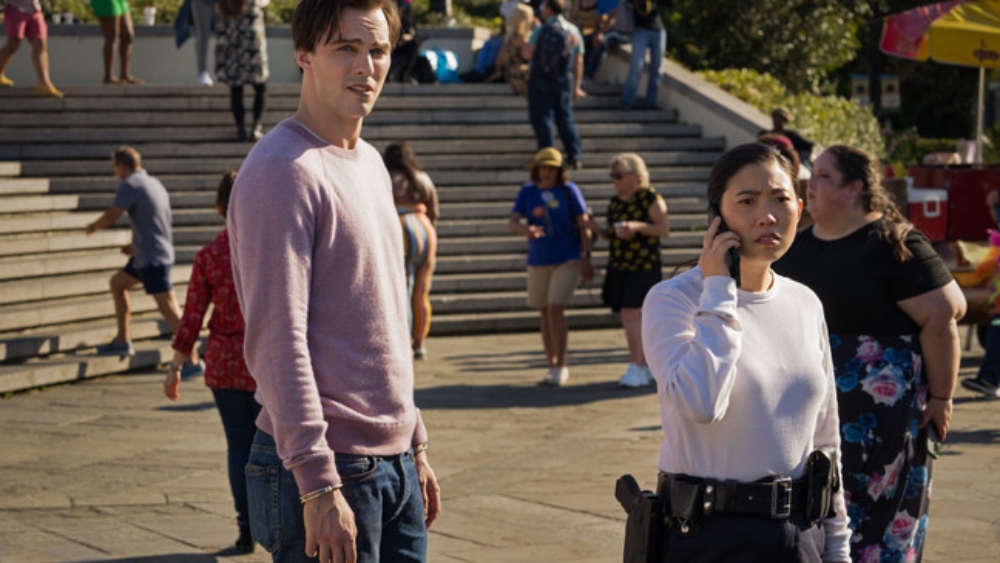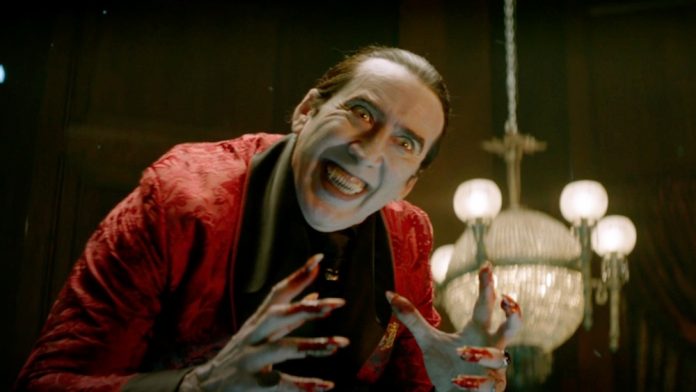Not even the sight of Nicolas Cage sipping blood out of a martini glass can save Renfield, a contemptible new action-comedy that inexplicably fails to capitalize upon his uniquely intense and charismatic presence as a flamboyant, throat-slashing Count Dracula.
Cage’s alchemical performance style, cultivating dark mystique through prankish instinct, is well-suited to a role this arch and indulgent. Giggling ghoulishly with a mouth full of blood, the actor sinks his needle-point teeth into playing Drac with sarcastic, scenery-devouring delight. It is a performance at once giddily his own and in thrall to past incarnations of the character, from Bela Lugosi to Christopher Lee and Frank Langella; his shock-white visage and exaggerated gestures even evoke Max Schreck‘s original Nosferatu. Cage is the most compelling reason to see Renfield, which makes it all the more frustrating that he’s squandered in a supporting role.
As the title suggests, the spotlight here instead swivels to Dracula’s long-time servant, an effete and cowering Englishman played by Nicholas Hoult. An amusing prologue digitally inserts both stars into the vintage, black-and-white stagings of Tod Browning‘s 1931 Dracula, with Cage making a meal of Lugosi’s lines and Hoult in the role of Dwight Frye, so as to reacquaint us with the bond between Dracula and his faithful “familiar,” a real estate agent turned devoted lunatic who’s aided and abetted the Prince of Darkness across centuries.

Still a sycophant but a fanatically devoted, bug-eating maniac no more, Hoult’s prim-and-proper Renfield gains temporary super strength from his creepy-crawly diet — convenient in a film that re-envisions him as a self-effacing action-hero. In recent times, Renfield has also grown a conscience and, rounding up victims for his boss to feed upon, has joined a support group for survivors of abusive or codependent relationships (the evil exes they describe become Renfield’s targets). Soon enough, with words of affirmation ringing in his ears, the long-suffering accessory to evil starts to see himself as a victim as well, in a “toxic relationship” with the world’s most demanding boss.
Deeply silly, defanged, and conspicuously desexualized though it is, this angle on Bram Stoker‘s epistolary novel — that exposure to modern “therapy speak” could set Renfield free from the psychic prison that a vampire’s kiss has left him in — is the main conceptual joke of Renfield. Though based on an original story by The Walking Dead’s Robert Kirkman and further fleshed out by director Chris McKay (The LEGO Batman Movie), the film was written by Rick and Morty alum Ryan Ridley, and it echoes that latter series’ obnoxious and incessant self-parody more than it channels any previous take on the Dracula mythos. (Perhaps Mel Brooks‘ Dracula: Dead and Loving It was a distant reference point, but one longs for, to no avail these days, a satirist of Brooks’ rank and skill.)
Instead, Renfield features running gags about ska music and some guy named Kyle, and even its needle drops feel like missed opportunities. (“Na Na Na,” the most generic that My Chemical Romance has ever sounded, gets a workout.) The presiding mood is that of a once-edgy script that’s been gathering dust in a studio executive’s drawer since 2010; that mood extends to the film’s inane conception as one of those godforsaken action-comedy mash-ups, the proliferation of which is now commonly attributed to the success of Deadpool. Relentlessly glib, hyperactive, and blood-splattered though it is — complete with record-scratch voice-overs and witless asides such as Hoult noting “I was not expecting that” amid ripping a room full of ne’er-do-wells to gory shreds — I thought more frequently of box-office bomb R.I.P.D. and Netflix’s blighted Bright, with their barely-there attempts at world-building and dead-on-arrival comedic stylings.

Still, there are flashes of inspiration to be found in the grotesque prosthetic makeup, especially that applied to Cage after Drac is exposed to sunlight, and in some of the cartoonish sequences of mass slaughter. At one point, a henchman’s arm is ripped out of its socket and promptly used to stake another into a door frame; such torrents of blood splash across the screen during these sequences, one of which ends with Renfield climbing down from a mountain of freshly deceased corpses, that the overall effect is over-the-top silly rather than scary or disturbing, a tone that amplifies the film’s flip attitude but also compounds its wearying sense of triviality.
Set in modern New Orleans, though the film so favors generic warehouse backdrops that it never achieves a sense of place, Renfield parallels its title character’s efforts at emancipation from his bloodsucking boss with a tepid subplot involving Awkwafina as the only non-corrupt cop in the city going up against members of a local mob family (Shohreh Aghdashloo, Ben Schwartz). She and Renfield form an uneasy alliance, one that’s coded as romantic despite the lack of chemistry between both actors; in fairness, their dynamic is written as such a functional grab-bag of cop-movie cliches that endeavoring to liven up the material, rather than merely recite it, might have been more painful for all involved.
Telling, as well, is the emphasis on Renfield’s relationship with Dracula as a purely professional bond, even as the vampire instructs his assistant to return with “a table of nuns” or “a school bus full of cheerleaders” for him to feast on. “Don’t make it a sexual thing,” he reprimands Renfield in issuing this command; given the innate nocturnal eroticism of Dracula as a figure in pop-culture mythology, such a cop-out feels akin to dereliction of duty on the filmmakers’ part, especially in a movie so eager to up the gore quotient to absurdist heights. One longs for an actor of Cage’s caliber and fearlessness to tackle the character again, albeit hopefully in a film that gives them material to actually rise to rather than blithely vamp alongside.
Renfield is now playing in theaters nationwide courtesy of Universal Pictures.
Grade: C-



